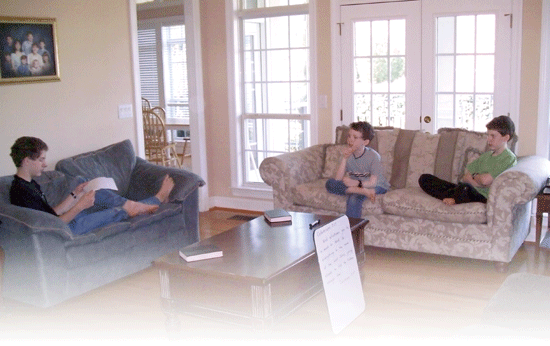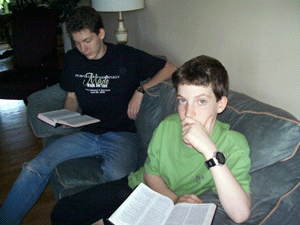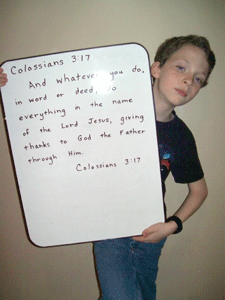
Have you considered spending a summer immersed in the Bible? What would
it be like to focus on Bible memory in your homeschool with the goal of
speaking and living out the Word of God so that students become
effective ambassadors for Jesus Christ?
This is the goal of the National Bible Bee, which was inaugurated by the
Shelby Kennedy Foundation this year. Over 17,000 children were enrolled
in the Bible Bee in its first year.
As of the writing of this article, the local competitions have been
completed, and we wanted to report on this tremendous opportunity.
Being a “Bee-liever”
This year our family learned about the new National Bible Bee and
registered online at biblebee.org. Participants had the choice of
several different Bible translations when they registered. In May the
Bee-lievers Handbook became available for download and we dove into
memorization.
The amount of study material was immense, and we realized that we would
not be able to master it all. So we decided to set a realistic goal for
our family of two verses a day. We incorporated Bible memory into our
daily school. Our students spent about 15-30 minutes memorizing
together, and the same amount of time memorizing and reviewing on their
own. We had to learn to say the reference at both the beginning and end
of the verse, so oral practice was very helpful. We used the daily
memory work for our handwriting practice as well.

|
|
Studiously preparing for the Bible Bee
|
Memorization Skills
Our goal of reviewing past verses and learning two new verses a day
created an intense Bible immersion. As a result, we quickly honed our
memorizing techniques.
My high-school-age son recorded the verses and listened to them over and
over. He found that he could memorize more than two verses a day, and
that it was more strategic to begin with the longer passages in level
four because they incorporated many of the short verses from levels one
and two.
My middle-school son memorized best by learning the verses in order. In
each level the verses are laid out in the order they appear in the
Bible. He liked relating where the verses occurred in each book, and it
helped him remember the references better. His favorite tip was to begin
with the reference and the first few words and repeat these together
over and over until it was anchored in the mind, then work through the
rest of the Bible verse repeating phrases until they stuck.
White Boards and Index Cards
My elementary-age son liked having a verse written on a white board so
that he could erase one word at a time. He would repeat the verse,
supplying the missing word each time. He usually had the verse memorized
by the time the twelfth word was erased. (To make good use of his time,
I wrote the verse for him.)
He also liked having his verses on index cards. We printed the level one
verses, cut along the lines, and glued them to index cards. Though the
verses can be printed onto cardstock, he liked the feel of index cards
better than cardstock cut with a paper cutter. He carried his cards with
him on vacations, dentist appointments, etc. We used them every day to
review, and by the end of the summer we were reviewing for about 30
minutes.
Bible Knowledge
The second part of the Bible Bee puts Bible knowledge to the test. Level
one and two are provided on memory cards, but the upper levels are based
on studying six books of the Bible. We used these six books for our
morning family devotions. The children took turns reading several verses
of a chapter and my husband led them in a discussion of the passage. For
level one and two questions, we used the time after dinner to learn and
quiz the material. Answers do not have to be verbatim, which makes this
material easier to master. In addition we already knew some of the
material, such as the names of the books of the Old and New Testament,
which we had learned over the years in Sunday school.
Reaping Benefits
The Bible Bee encourages parents to keep in view the blessing of
memorizing God’s word, and to be careful not to exasperate children. If
we thought that students were becoming frustrated, we stopped for the
day. We were amazed at the power of God’s word to teach us great truths
and change us spiritually. Though the task of memorizing could be
arduous at times, we quickly reaped the benefit of knowing Scripture. We
chose the same version of the Bible that is read in our church, and
every Sunday we would exchange glances when a Bible verse that we knew
by heart was used in worship. The Bible verses came to mind as we
studied other parts of the Bible or when we were dealing with modern
issues.

|
|
Proudly holding Colossians 3:17, a chosen verse for memorization
|
Changes for 2010
The National Bible Bee is considering several changes for the 2010
competition. This year (2009) a student would have had to memorize about
15 verses a day to complete the material. For next year, they are
considering reducing the number of Bible memory passages for all age
groups, particularly the primaries. They may also repeat a significant
number of the 2009 core Bible memory questions. They are considering
making the 2010 study guide available earlier. Though the online
enrollment process was not cumbersome, they plan to further simplify it.
They also may schedule the local Bible Bees on the last Saturday in
August rather than the Saturday following Labor Day.
The Local Competition
On the day of the local Bible Bee, parents checked their children in at
their competition location. We had families from a large geographic area
attending the bee, and the hosts provided information on nearby
restaurants for lunch. Parents were not able to watch the competition.
The written test was administered like a classroom test, and the oral
rounds were like private interviews between the student and the judges.
Tightly-organized schedules walked the students through the written test
round and two oral rounds. The written and oral rounds used both Bible
memory questions and Bible knowledge questions.
Though we were able to master less than a quarter of the Bible verses,
our students felt good about their participation. The competition
administrators and student contestants were wonderful people. Best of
all we spent a summer immersing ourselves in God’s word, and that was
the best experience of all.
Joyce McPherson is the creator of the online programs “Homeschool Tools”
and “Shakespeare Tools,” as well as the author of a series of
biographies for Greenleaf Press. With her husband, Garth, she
homeschools their nine children. She can be reached through
teachingtools.org or at mcpclan@comcast.net.










